🌻 don't take the bait
vice signaling is eating silicon valley
There’s a new generation of AI companies for whom distribution is the product. They embrace vice signaling, plastering streets and feeds with ads that say “Stop Hiring Humans” (Artisan) and “Cheat On Everything” (Cluely). These signs intend to goad people into snapping pictures and posting dunks. Bernie Sanders recently tweeted a photo of Artisan’s bus stop ad; Friend’s subway billboards are now the most talked about in New York, racking up more than 25 million views.
On Elon Musk’s X, users are now paid by the view. Savvy creators around the world post bait—statements that are maximally divisive, or so obviously wrong as to beg to be dunked on—in return for biweekly bank deposits. For these posters, baiting is like a video game that pays out in cash. But for our information ecosystem, rage-bait provides a distorted, exaggerated, and often straight-up false view of what our fellow citizens believe.
Mechanize, a startup creating RL environments (simulated playgrounds for AI agents to train in), doesn’t go for the splashy ads. They prefer plaintext blog posts, tweeted out as screenshots. “Little can stop the inexorable march towards the full automation of the economy. We should be glad,” one essay concludes. Are they true believers in robots taking all the jobs? Probably. But other incentives are in the mix. There are a million startups creating RL environments, recruiting is really hard, and hot takes are one reliable way to stand above the fray.
The viral trend that made me saddest involved young women tweeting thirst traps to announce that they just joined a startup and were looking to make friends in tech. Most were Asian and looked between the ages of 17 and 24, taking smizing selfies in skintight clothes. I think women can post whatever on their personal accounts, but trading looks for lead-gen (on “consumer data marketplaces,” of all things) is a losing game.
What we’re seeing is the Donald Trump school of tech marketing: Be as provocative as possible, then let others’ moral outrage propel you into prominence. It’s an iron law of social climbing—irrelevant people desperately want to be relevant and will say crazy shit to make it happen. There are copious financial rewards for whoever excels. As performance art, I can even respect it.
The bit is working, too. I was in New York and DC last week trying to get a vibe for how the East Coast views tech today. I was surprised to hear a palpable, slightly insecure sense that SF and AI are what’s driving culture and business forward—a view reinforced by the ubiquitous ads for Friend pendants, the Eliezer book, gambling apps, and various inscrutable forms of enterprise SaaS. Yes, New York is now getting the billboards too.
But there was also distrust. Some friends said they were embarrassed to admit they worked in AI, for fear of censure. One newsroom I visited looked hollowed out, near-empty at 11am on a Thursday, while a reporter there complained about how much the company spent on pointless AI integrations to patch their losses. Media folks were on the back foot. Editors knew that important things were happening in SF’s AI scene, but not really how it worked or what values it operated by. Lots of talk of bubbles and energy use, which are half truth and half wishful thinking. From three Bay Area refugees: Silicon Valley now seems “valueless,” “like it died 15 years ago,” and “a little bit evil.” New York may be static and decadent, they implied, but at least it has shame.
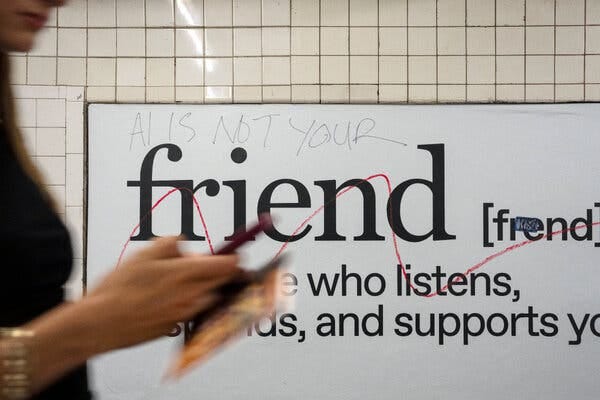
Back home, I asked a founder I know if he thinks that AI is a bubble. “Yes, and it’s just a question of timelines,” he said. Six months is median, a year for the naive. Most AI startups are all tweets and no product—optimizing only for the next demo video. The frontier labs will survive but it’ll be carnage for the rest. And then what will his founder friends do? I ask. He shrugs. “Everyone’s just trying to get their money and get out.”
Grift is not my primary experience of the Bay, an ecosystem where I’ve found my most treasured friends, with its legendary respect for weird nerds with big ideas, what still feels like—in spite of it all—the last place the American dream still survives. Unlike New York, SF continues to export plenty of novel ideas1: remote work, YIMBYism, generative AI. But how can I blame others for misunderstanding, given the nihilistic stories tech companies and VCs project about who we are? If Cluely is the face of SF, they are right to hate us for it.
As with Trump’s shock jock politics, it’s up to us not to take the bait. We do not have to publicly denounce every incendiary ad, particularly when it comes from an anonymous poster or tiny seed startup. Instead of quote-tweeting, you can mute and ignore. Often, dis-engagement is the best way to waste the master-baiters’ time and money.
Or if you must, go test these people’s most outlandish claims. If someone says they work on agents, ask if they personally let AI book their flights. (I’ve never gotten a yes.) Never mind automating the entire economy; has Mechanize eliminated a single software job? I remember living in Brooklyn during the crypto summer of 2021, attending lavish NFT raves funded by smoke and promises. When the products don’t work yet, the tweets and the parties are all that you have.
I also worry that Silicon Valley now punishes outward earnestness or virtue; young technologists have expressed fears of appearing soft—or worse—woke. I don’t want these vice-signalers to represent the industry, giving credence to already budding distrust of tech. If the bubble pops, or if an SBF-style scandal erupts, or if we get evidence mapping social crises directly to AI, the public will not be kind to those who got rich bragging on the way.
Here, it’s worthwhile to reflect on the Pope’s recent words:
Technological innovation can be a form of participation in the divine act of creation. It carries an ethical and spiritual weight, for every design choice expresses a vision of humanity. The Church therefore calls all builders of AI to cultivate moral discernment as a fundamental part of their work—to develop systems that reflect justice, solidarity, and a genuine reverence for life.
Marc Andreessen mocked him, but the Pope is right, of course. It’s harder and nobler to build pro-human technology. Not just pro-consumer, as in satisficing individual impulses, but also pro-social, as in enriching our shared social and civic life. Silicon Valley is capable of great inventions. I feel safer taking Waymos and smarter learning with ChatGPT. AlphaFold was a tremendous accomplishment, and hopefully a sign of more biology breakthroughs to come. I’ve found countless friends and jobs on Twitter and Substack, (I think) without totally frying my brain. When your product is good enough, you can market on the merits and not the threats.
Touching grass is the other antidote to taking the bait. Go connect with real living people and real life experiences. When you’re deep in conversation you won’t even notice the dumb subway ads. I had drinks with my friend nikhil last week at a cozy East Village sake bar, where he told me about reading all this online fear-mongering about the death of partying and literacy and democratic trust, then looking up and seeing New Yorkers booking out the Metrograph and knocking doors for Zohran and turning the NYC marathon into an ecstatic 26-mile block party. And when you see everyone outside, talking and laughing and falling in love, the world no longer looks so grim.
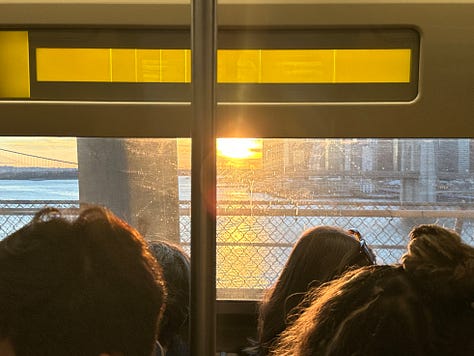
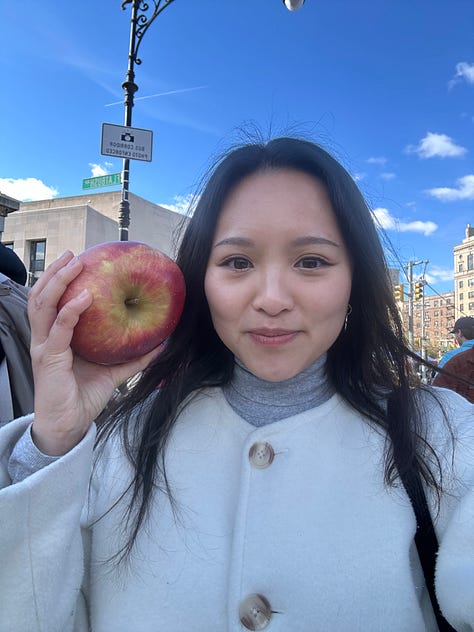
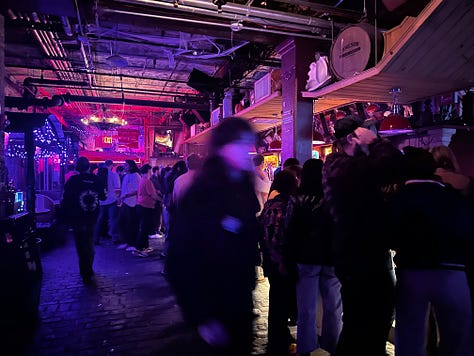
Short post today, written mostly in my Notes app. Sorry for the gloominess; more (and sunnier stuff) soon!
A few relevant recent reads:
“Numb at Burning Man,” Sam Kriss: Nothing has changed since the 60s except enterprise SaaS
“Trolling Democracy,” Nathan Pemberton: Vice-signaling through the lens of right-wing groyper politics
“POV: AI GF,” Sarah Chekfa: A surreal story about what it’s like to be someone’s AI girlfriend
“Social media is a demonic force in the world,” David Oks: Charlie Kirk murder videos are bad for the soul
P.S. On November 19 I’ll be joining Gazetteer, a SF indie paper, for an “Analog” event where we’ll discuss the print publishing revival. There’s an open bar, and talks on IRL shopping and urban farming too. You can get tickets here.
Warmly,
Jasmine
I initially listed prediction markets here but was corrected that Kalshi/Polymarket are NYC based. So maybe that’s a big NYC export!


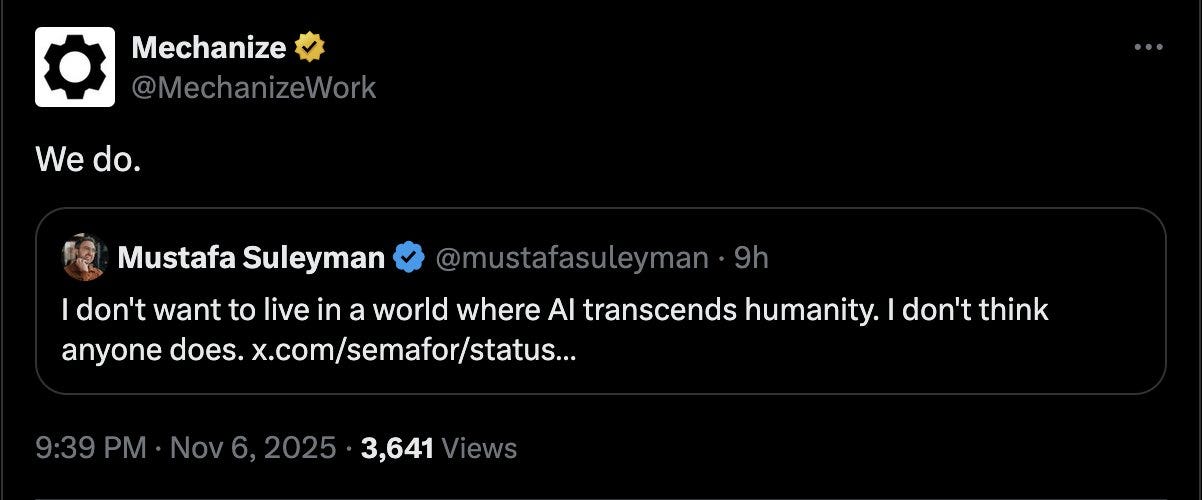
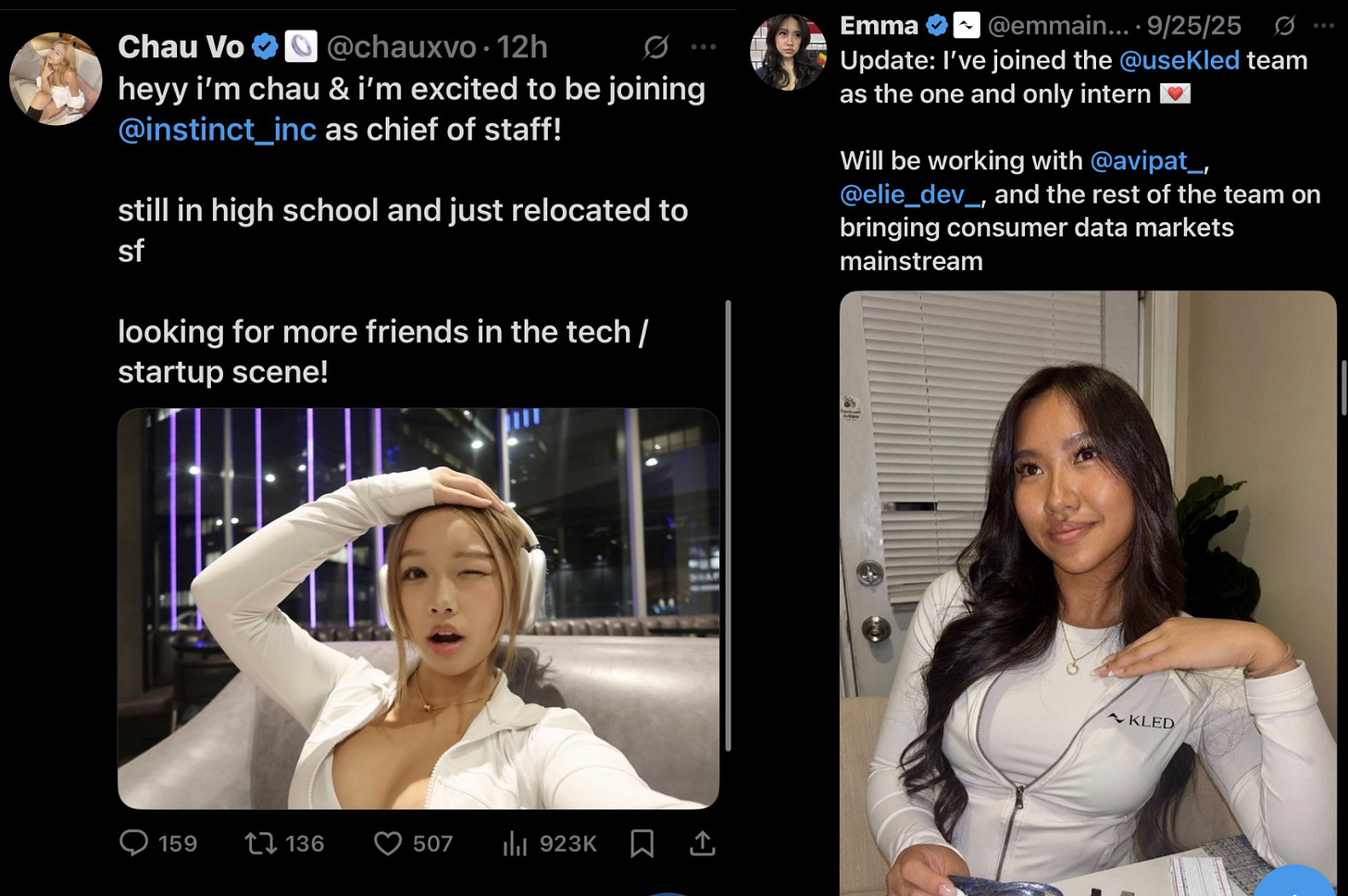
I love this! And i feel this so deeply — it feels building technology is no longer driven by the motive of building for human progress, it’s driven by this quest for virality
'Paid by the view' has a lot to answer for in our modern media era. I can't think of a worse way to distort our world view if all we see are the things connected by our common tendency to be a voyeur of the content that passes by us.